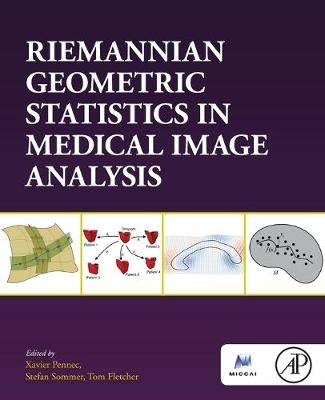
Riemannian Geometric Statistics in Medical Image Analysis
Academic Press Inc (Verlag)
978-0-12-814725-2 (ISBN)
Riemannian Geometric Statistics in Medical Image Analysis is a complete reference on statistics on Riemannian manifolds and more general nonlinear spaces with applications in medical image analysis. It provides an introduction to the core methodology followed by a presentation of state-of-the-art methods.
Beyond medical image computing, the methods described in this book may also apply to other domains such as signal processing, computer vision, geometric deep learning, and other domains where statistics on geometric features appear. As such, the presented core methodology takes its place in the field of geometric statistics, the statistical analysis of data being elements of nonlinear geometric spaces. The foundational material and the advanced techniques presented in the later parts of the book can be useful in domains outside medical imaging and present important applications of geometric statistics methodology
Content includes:
The foundations of Riemannian geometric methods for statistics on manifolds with emphasis on concepts rather than on proofs
Applications of statistics on manifolds and shape spaces in medical image computing
Diffeomorphic deformations and their applications
As the methods described apply to domains such as signal processing (radar signal processing and brain computer interaction), computer vision (object and face recognition), and other domains where statistics of geometric features appear, this book is suitable for researchers and graduate students in medical imaging, engineering and computer science.
Xavier Pennec’s research interest is at the intersection of statistics, differential geometry, computer science and medicine. He is particularly interested in the mathematics involved in computational anatomy: geometric statistics involving statistical computing on Riemannian manifolds and other geometric structures . He has contributed mathematically grounded methods and algorithms for medical image registration, statistics on shapes, and their translation to clinical research applications. Stefan Sommer’s research focus is on modeling and statistics of non-linear data with application to shape spaces, functional data analysis, and image registration. This includes foundational and algorithmic aspects of statistics on manifold valued data, and computational modeling and statistical analysis of deformations occurring in computational anatomy. Tom Fletcher’s research focus is on solving problems in medical image analysis and computer vision through the combination of statistics and differential geometry
Part 1 Foundations of geometric statistics 1. Introduction to differential and Riemannian geometry 2. Statistics on manifolds 3. Manifold-valued image processing with SPD matrices 4. Riemannian geometry on shapes and diffeomorphisms 5. Beyond Riemannian geometry
Part 2 Statistics on manifolds and shape spaces 6. Object shape representation via skeletal models (s-reps) and statistical analysis 7. Efficient recursive estimation of the Riemannian barycenter on the hypersphere and the special orthogonal group with applications 8. Statistics on stratified spaces 9. Bias on estimation in quotient space and correction methods 10. Probabilistic approaches to geometric statistics 11. On shape analysis of functional data
Part 3 Deformations, diffeomorphisms and their applications 12. Fidelity metrics between curves and surfaces: currents, varifolds, and normal cycles 13. A discretize–optimize approach for LDDMM registration 14. Spatially adaptive metrics for diffeomorphic image matching in LDDMM 15. Low-dimensional shape analysis in the space of diffeomorphisms 16. Diffeomorphic density registration
| Erscheinungsdatum | 13.09.2019 |
|---|---|
| Verlagsort | San Diego |
| Sprache | englisch |
| Maße | 191 x 235 mm |
| Gewicht | 1310 g |
| Themenwelt | Informatik ► Theorie / Studium ► Künstliche Intelligenz / Robotik |
| Mathematik / Informatik ► Mathematik ► Geometrie / Topologie | |
| Mathematik / Informatik ► Mathematik ► Statistik | |
| Medizin / Pharmazie ► Medizinische Fachgebiete ► Radiologie / Bildgebende Verfahren | |
| ISBN-10 | 0-12-814725-3 / 0128147253 |
| ISBN-13 | 978-0-12-814725-2 / 9780128147252 |
| Zustand | Neuware |
| Haben Sie eine Frage zum Produkt? |
aus dem Bereich


